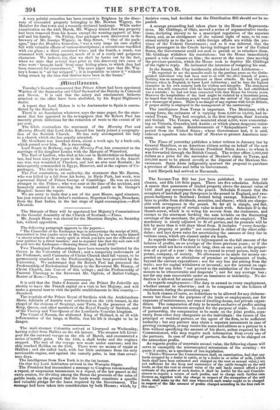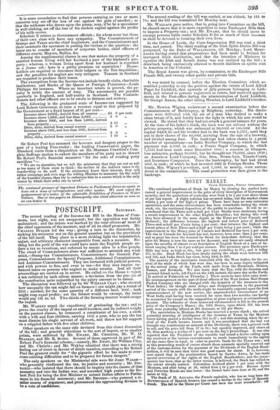The Income-Tax Bill has just been published. It contains 189
clauses, and fills 130 folio pages. There are five schedules. Schedule A enacts that possessors of landed property above the annual value of 1501. shall pay sevenpence in the pound. Schedule B enacts that the occupiers of land shall pay threepence in the pound in England, and two- pence-halfpenny in Scotland ; Ireland being exempt. Schedule C re- lates to profits from dividends, annuities, and shares; which are charge- able with sevenpence in the pound. So far all is simple, and fair, inasmuch as property of certain value is dealt with. Schedule D is the thumb-screw, which is to wring his secrets from the tradesman, and extract to the uttermost farthing the sum leviable on the fluctuating earnings of the merchant, the professional man, and the employe. The machinery is nicely adjusted to fit all parties, and its pressure will be felt by more than it will draw blood from. It includes "every descrip- tion of property or profits" not contained in either of the other sche- dules; and lays down rules for ascertaining the amount of duty due in various cases, which are classed under six heads.
As regards trade—The duty to be:computed on the full amount of the balance of profits, on an average of the three previous years ; or if the concern shall not have existed so long, then on one year, or the propor- tion of a part of a year : the duty to extend to every person, body cor- porate, company, or society. No allowance to be made for money ex- pended on repairs or alterations of premises or implements of trade, beyond the current expenditure ; nor for any loss not arising from the trade; nor for capital withdrawn or invested ; nor for interest on capi- tal; nor for any debts "not proved to the satisfaction of the Commis- sioners to be irrecoverable and desperate"; nor for any average loss ; nor for any sum recoverable under an insurance or indemnity. No de- duction is allowed for annual interest.
As regards employments—The duty to extend to every employment, whether annual or otherwise ; and to be computed on the balance of emoluments daring the preceding year. In both classes of cases, no deductions to be allowed for any disburse- ments but those for the purposes of the trade or employment, nor for expenses of maintenance, nor rent of dwelling-house, nor private expen- diture. The computation of duty to be made exclusive of profits arising from lands and tenements occupied for the purpose of trade. In cases of partnership, the computation to be made on the joint profits, sepa- rately from other duty chargeable on the individuals : the return of the principal or resident partner, or the agent of the firm, to be sufficient authority ; but any partner may claim a separate assessment in case of proving exemption, or may return his name and address as a partner in a firm without specifying the amount of his share, unless required by the Commissioners, who may require such information from every one of the partners. In case of change of partners, the duty to be charged on the antecedent profits.
As regards profits of uncertain annual value, the following clause will serve to exemplify the microscopical minuteness of the scrutiny : we quote it entire, as a specimen of tax-legislation.
"Third—Whenever the Commissioners shall, on examination, find that any lands occupied by a dealer in cattle, or by a dealer in or seller of milk, (which lands shall have been estimated and charged on the rent or annual value,) are
not sufficient for the keep and sustenance of the cattle brought on the said lands, so that the rent or annual value of the said lands cannot afford a just
estimate of the profits of such dealer, it shall be lawful for the said Commis- sioners to require a return of such profits, and to charge such further sum thereon as, together with the charge in respect of the occupation of the said
lands, shall make up the fall sum wherewith such trader ought to be charged in respect of the like amount of profits charged according to the first rule in this ease."
It is some consolation to find that persons carrying on two or more concerns may set off the loss of one against the gain of another ; so that the milkman who draws upon the pump, may, if he be a speculator in well-sinking, set off the loss of his sunken capital against the profits of his milk-scores. Schedule E relates to Government officials ; for whom none but those of their own class will have any sympathy. The Commissioners of Stamps and Taxes are the chief inquisitors, and the Commissioners and their.assistants the operators in putting the victims to the question : the latter are to consist of members of corporate bodies, chief officers of different courts, Mayors, Bailies, &c.
Among the supplemental classes is one that makes the property of a married woman living with her husband a part of the husband's pro- perty; whereas, a woman living apart from her husband is regarded as a femme sole : here is a pretty premium on separation ! House- holders are required to denounce their lodgers to the Tax-inquisition ; and the penalties for neglect are very stringent. Tenants in Scotland are required to produce their leases.
The exemptions from the Income-tax include benefit-clubs, charitable institutions, and Stocks of the Queen or Foreign Potentates—Louis Philippe for instance. Where an incorrect return is proved, the pe- nalty is treble the amount of duty. The assessments are payable quarterly in England, and half-yearly in Scotland. The Commis- sioners and other officers are to be sworn to fairness and secrecy.
The following is the graduated scale of Income-tax suggested by Lord Robert Grosvenor, to raise a revenue equal to that proposed by the Government at a fixed impost of 31. per cent—
Incomes above 2,0001., derived from all sources £4 0 per cent.
Incomes above 1,0004 and less than 2,000/. 3 0 „ Incomes above 5001., and less than 1,0001., derived from property 2 10 „ Ditto, ditto, derived from casual sources 2 0 „ Incomes above 1504 and less than 5001., derived from property 2 0 „ Ditto, ditto, derived from casual sources 1 10 „
Sir Robert Peel has assumed the honours and dangers proper to the post of a leading Free-trader : the leading Conservative paper, the Standard, starts from a disquisition on Mr. Sharman Crawford's Com- plete Suffrage motion to exhort the members of its party not to thwart Sir Robert Peel's financial measures " for the sake of evading petty sacrifices "—
" We are no alarmists, but we tell the aristocracy that they are not so safe as too many of them seem to think : the decline in the indirect taxes is the handwriting on the wall. If the aristocracy know their interest, they will rather encourage and even urge the willing Minister to measures for the relief of the humbler classes, than try to embarrass him in a course which is the only course by which their order can be saved."



























 Previous page
Previous page